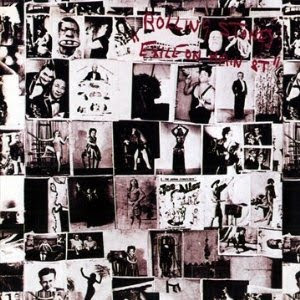
As much as I love music of a myriad of styles and textures, there is a special place in my heart for what has come to be known as “Classic Rock” not because it has loud guitars and feverish singing, but because it has soulfulness, a spirituality that can’t be found on your average Kanye West or Radiohead record. There is, in records like
Led Zeppelin IV, a hand-worn and labored over quality that resonates deeper than the tunes or lyrics might. Part of this that these records are old, part of it the analog tools used to record them, but a lot of it is that they were crafted with a spirit of adventure: the resolution of mysticism and mythos that bands like Zeppelin infused their albums with. They didn’t just play rock and roll, they believed in it. That belief is something naïve and archaic now, which is why LCD Soundsystem’s 2007 record,
Sound of Silver was such a revelation. Singer and composer James Murphy found some of that classic spiritualism in the synthesizers and techno rhythms of modern dance music, making a blend of electric body and organic songcraft that captured the hipster zeitgeist of a generation who no longer believed the classic rock mythos, but longed to anyway. Needless to say, any follow-up to that record has some work laid out for it.
This Is Happening, the aforementioned follow-up, sounds a lot like it’s predecessor, a mismatch of influences that range from Talking Heads and Devo to Radiohead and The Strokes. These songs are more open though, less immediate and desperate than the tracks on
Sound of Silver and they are much longer. The average song is upwards of seven minutes, but Murphy has always known how to get the most out of overlong tracks. The record starts off with “Dance Yrself Clean” in a Kermit-voiced accusation, Murphy regales a friend’s who’s “talking like a jerk except you are an actual jerk” before exploding into dance-floor euphoria. Murphy takes on the title in all its brilliant, knowing that the music he makes can never really solve people’s problems, but trying anyway. “Drunk Girls” is a frantic pop song, the only on the record, which spits out caustic one liners that aren’t so much about drunk girls but are more about drunk boys and how drunk boys chase and curse and need drunk girls. “One Touch” is a familiar development of Murphy’s Daft Punk obsession and “All I Want” has him peeking over David Bowie’s shoulder to create an infectious sad-sack anthem (It turns out all he wants is pity and bitter tears, and to be taken home. It wouldn’t be as sad if it wasn’t so funny or grand.)
“I Can Change” rips bouncy 80’s synth into the strongest melody on the album and one of the most depraved love songs I’ve ever heard. Murphy, truly grown as a confident and passionate singer, degrades himself for the love of a girl he begs to “bore me and hold me and cling to my arms”. It’s a stellar track about co-dependence gone wrong. Part of what’s great about LCD’s lyrics are the way they often blend the line of irony and sincerity, that they mean the opposite of what they say upfront. If we learn anything from “I Can Change”, it’s that Murphy can’t change and the girl doesn’t really want him to. It’s a vicious cycle of love and hurt placed brilliantly in the middle of the record, the way “All My Friends” cemented
Sound of Silver together. The album then careens into the three-minute intro of the boisterously non-commercial “You Wanted a Hit” and then to the frantic rant/art-rock of “Pow Pow” which boasts a chorus of “it goes pow pow pow pow pow” repeated over and over again. The deconstruction of language is intentional here and denotes other Murphy tracks like “Get Innocuous!” where he derides the apathetic nature of music listeners. He seems to think that nobody wants his blend of humor, self-reflection, and nostalgia, and would prefer “pow pow pow pow pow”.
Indeed one often gets the sense that Murphy is getting tired of his audience. Several of the tracks like “One Touch” and “Hit” seem to mock listeners who are unsatisfied with what they get on this go round, or who hear his killer grooves without hearing the killer lyrics he wraps them around. It’s been hinted at that this will be LCD Soundsystem’s final record, maybe because Murphy feels the band or he is becoming stale or unappreciated. That insecurity makes this a fragile record, one that’s as easy to tear apart as it is to build up. It isn’t as tight as the bands first two outings, but there is something disquieting about the looseness of this record. Maybe it’s that archaic, naïve spirituality creeping quietly below the surface. You get a hint of it on “Somebody’s Calling Me” which distorts Iggy Pop’s “Nightclubbing” into a modern blues about the lack of connection in modern society. Murphy ironically relates it to the technology he uses to make the beautiful sounds through which he sings: “somebody’s texting me to be my girl/ constantly texting me to be my girl/ but the text won’t take away the nights that creep/ and my mouth don’t move when I’m in too deep”. He almost growls it, exhausted and sick. The track sticks out from the euphoria of “Pow Pow” and the brilliant resolution of closer “Home”.
“This is what you waited for but under lights we’re all unsure. So tell me, what would make you feel better?” asks what may become the final song by LCD Soundsystem. The irony dealer finally gone sincere, the fanboy finally grown, Murphy sounds like he’s listening for an answer. 5/5
 A record with this many problems shouldn’t be this good, but that’s life as usual for the Hold Steady’s Craig Finn, a guy just far removed enough from his songs of down-and-outs to act as a bar band moralist, but just close enough to them that you wander why and for whom he’s moralizing. You question his authority even as you start to think that maybe he wants you to do just that. His story-songs are hook-strong and delivered in the nasally grandeur of Finn’s singing (stronger and more nuanced than ever as he sings more than speaks) and they all have tremendous problems. The first is the production, which is steeped in power-ballad, roots-rock cliches (so many choirs!) second is the image Finn is trying to project. This band has always been too big for his britches, going for Bruce Springsteen and inevitably falling short and their ambitions are obvious here, as melodramatic as that album cover. The last minutes of the album are ridiculously maudlin
A record with this many problems shouldn’t be this good, but that’s life as usual for the Hold Steady’s Craig Finn, a guy just far removed enough from his songs of down-and-outs to act as a bar band moralist, but just close enough to them that you wander why and for whom he’s moralizing. You question his authority even as you start to think that maybe he wants you to do just that. His story-songs are hook-strong and delivered in the nasally grandeur of Finn’s singing (stronger and more nuanced than ever as he sings more than speaks) and they all have tremendous problems. The first is the production, which is steeped in power-ballad, roots-rock cliches (so many choirs!) second is the image Finn is trying to project. This band has always been too big for his britches, going for Bruce Springsteen and inevitably falling short and their ambitions are obvious here, as melodramatic as that album cover. The last minutes of the album are ridiculously maudlin



